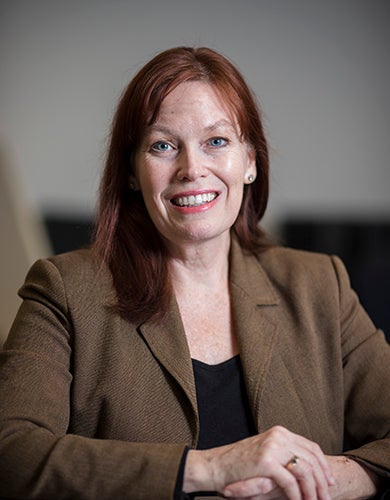Student: Roberta Bellamy
Her concerns led her to volunteer at the Association of Mexicans in North Carolina, an organization dedicated to promoting growth and transcultural understanding through education, health, advocacy and leadership.
Bellamy also noticed how stress and the environment worsened the conditions of those around her.
“My father had paranoid schizophrenia,” said Bellamy. “There were a lot of misconceptions about mental illness and mental health in general. How stress and the environment adds to it as far as mental health goes. I noticed how stress and the environment added to some of the biological conditions and difficulties that my father had.”
Bellamy’s experiences influenced her as an adult, prompting her to take an interest in the biopsychosocial spiritual approach to treatment.
“The biopsychosocial spiritual are all these pieces that make up the whole person,” said Bellamy. “If you have a biological illness – mental illness, paranoid schizophrenia, diabetes, high blood pressure or whatever it is – your social environment and your spiritual resources can either be part of the problem or part of the treatment and can be the resource to help deal with the other pieces.”
Soon, Bellamy began to see the biopsychosocial spiritual approach work with her father’s condition. She applied what she was seeing to the Latino immigrant community.
“Part of the things that I would see was that when the children went to school, they would be required not to speak any Spanish,” said Bellamy. “Our language is our identity, and when you’re asked to leave your identity at the door and you’re told that your identity is not welcomed here, and yet Mom and Dad speak Spanish, it was causing some stress levels in the children. I would be brought in because there were behavioral issues at home.”
Bellamy advised families to share pictures from their hometowns to ensure that children remained connected with their loved ones in Mexico. She encouraged students to write letters to their families as well.
“When we did that, we could see the behavioral levels decrease because the child then did not have this fragmented identity,” said Bellamy. “They had their support systems – their social piece – that was disrupting that psychological piece.”
Bellamy felt the need to address all four components of the biopsychosocial spiritual model in a larger systemic way. She wanted to find a program that would help combat the disparities she was seeing. At the undergraduate level, she started her education at Lenoir Community College before earning a master’s degree in marriage and family therapy from ECU. Once Bellamy became a provisional licensed marriage and family therapist, she realized that addressing policies would require research, prompting her to seek a doctoral degree at ECU.
Bellamy worked as a volunteer with the Association of Mexicans in North Carolina from the organization’s inception in 2001 up until her final year of her Ph.D. program. As part of her doctorate program requirement, Bellamy shifted her position at AMEXCAN, becoming its intern.
She now serves as the Director of Bi-National Research and Grants with the AMEXCAN organization, where she encourages bi-national research between academics in Mexico and eastern North Carolina. She also serves on the Board of Directors for the East Coast Migrant Head Start, an organization that offers early education to children of migrant and seasonal farm workers.
Bellamy hopes to continue helping students using the biopsychosocial spiritual approach to therapy.
“We are more alike than we are different,” said Bellamy. “We are becoming increasingly more global, and the need to be able to talk across these cultures and across the health care culture is necessary and a beautiful idea in my opinion. That’s the whole of the idea. We affect each other and we are affected by each other.”
Bellamy graduated Dec. 18. She works as a marriage and family therapist at her private practice in Greenville.
Statistics
College: College of Health & Human Performance
Major: Medical Family Therapy, Ph.D.
Age: 51
Classification/Year: Fall 2015 graduate
Hometown: Henderson, NC
Clubs & Organizations: American Association of Marriage & Family Therapists (AAMFT); Collaborative Family Healthcare Association (CFHA); East Coast Migrant Head Start; Phi Kappa Phi; The Raleigh Write to Publish; AMEXCAN; Amnesty International; World Vision
Hobbies & Interests: Books (European & Latin American literature, philosophy); martial arts; foreign travel, languages, & cultures; bladesmithing (knives & swords)
Favorites
Favorite hangout: Barnes & Noble bookstore
Favorite place to eat: sidewalk cafes in Mexico City
Favorite Movie: Doctor Zhivago (1965 version); The Women (1939 version)
Favorite website: The New York Times
Favorite place on campus: any library or coffee shop
Favorite class: Advanced Family Therapy Theories
Favorite band/musician: Joaquin Rodrigo
Motivations
Professor who influenced you the most: Dr. Angela Lamson
The one thing you cannot live without: My books
Role Model: My grandfather, Reverend Robert MacLean; and Coco Chanel
Your words to live by: “Growing up with mental health issues in my community and my family, I saw that’s what it’s going to take: not just working with the person who has the diagnosis. You work with the family and you make sure the kids get a decent education while they’re going through all this turmoil, and talk with the doctors and help the family navigate the health care systems.”
– Roberta Bellamy
